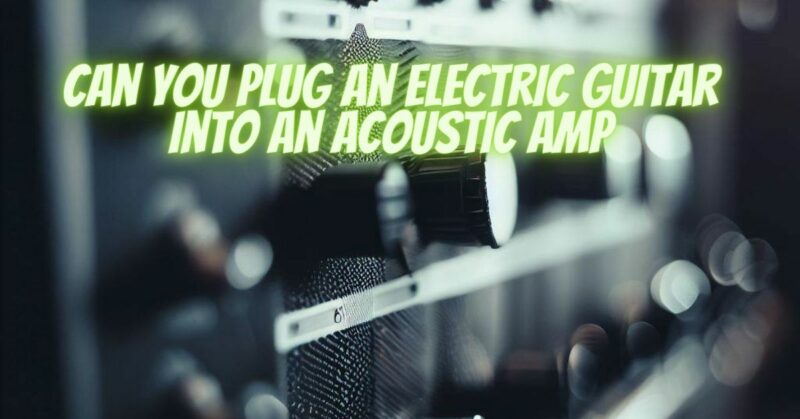The world of amplification for electric and acoustic guitars often involves separate amplifiers designed to enhance the unique characteristics of each instrument. While acoustic amplifiers are primarily tailored for acoustic guitars, many musicians wonder whether it’s possible to connect an electric guitar to an acoustic amplifier. In this article, we’ll explore this question and provide insights into the implications and considerations of using an acoustic amplifier with an electric guitar.
1. Compatibility:
Electric and acoustic amplifiers are designed with different tonal profiles in mind. Electric guitar amplifiers are optimized for the characteristics of electric guitar pickups, which produce a magnetic signal. On the other hand, acoustic amplifiers are tailored for acoustic guitars equipped with piezo pickups or microphones, which capture the natural sound of acoustic strings and body resonance.
2. Sound Characteristics:
When you connect an electric guitar to an acoustic amplifier, you may encounter some sound differences compared to using an electric guitar amplifier. Acoustic amplifiers aim to reproduce the natural, transparent tone of acoustic guitars, and they may not provide the same level of distortion, saturation, or tonal shaping options found in electric guitar amplifiers.
3. Clean Tones:
Acoustic amplifiers are known for their clean, uncolored sound. If you’re looking for a clean, undistorted tone for your electric guitar, an acoustic amplifier can provide a pure and transparent canvas for your playing.
4. Limited Overdrive and Distortion:
If you desire overdriven or distorted tones commonly associated with electric guitars, an acoustic amplifier may not be the ideal choice. While some acoustic amplifiers have onboard effects to simulate overdrive, they may not achieve the same depth and versatility as dedicated electric guitar amplifiers.
5. Consider the Pickup:
The type of pickup on your electric guitar can affect the compatibility with an acoustic amplifier. Piezo pickups, commonly found on acoustic-electric guitars, may produce better results when connected to an acoustic amplifier due to their similarity to acoustic guitar pickups.
6. Signal Processing:
Acoustic amplifiers often feature built-in effects like reverb and chorus tailored for acoustic guitars. These effects may not be optimized for electric guitar tones, so consider using external effects pedals for shaping your electric guitar’s sound.
7. Experimentation:
While acoustic amplifiers may not be the typical choice for electric guitarists, experimentation can yield interesting and unique results. Some musicians appreciate the clean and transparent character of acoustic amplifiers when used with electric guitars, especially in genres that require pristine, uncolored tones.
8. Speaker Size:
Keep in mind that the speaker size and configuration of your acoustic amplifier can impact the sound. Smaller speakers may not handle the low-end frequencies of electric guitars as effectively as larger speakers typically found in electric guitar amplifiers.
9. Versatility:
If you frequently switch between acoustic and electric guitars, you may prefer the versatility of having both types of amplifiers to accommodate the unique needs of each instrument.
While it is technically possible to connect an electric guitar to an acoustic amplifier, it’s essential to understand the potential sonic differences and limitations. Acoustic amplifiers excel at delivering clean, uncolored tones suitable for acoustic guitars but may not provide the same tonal flexibility and overdrive capabilities as electric guitar amplifiers. Experimentation can yield interesting results, but for the most tailored and versatile electric guitar tones, dedicated electric guitar amplifiers remain the preferred choice for many players.


